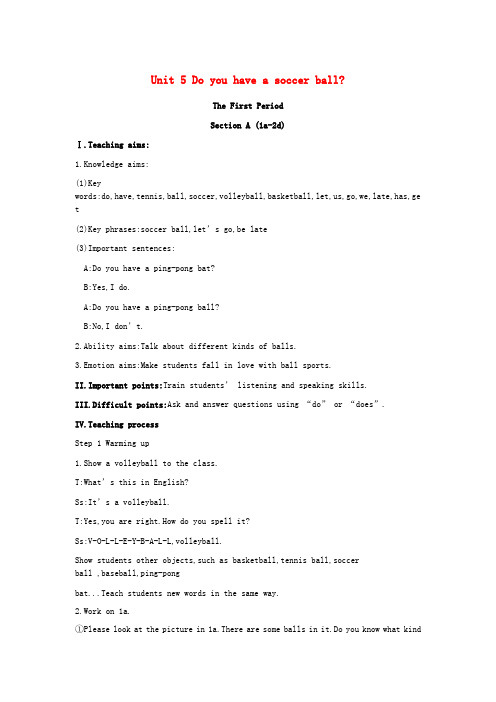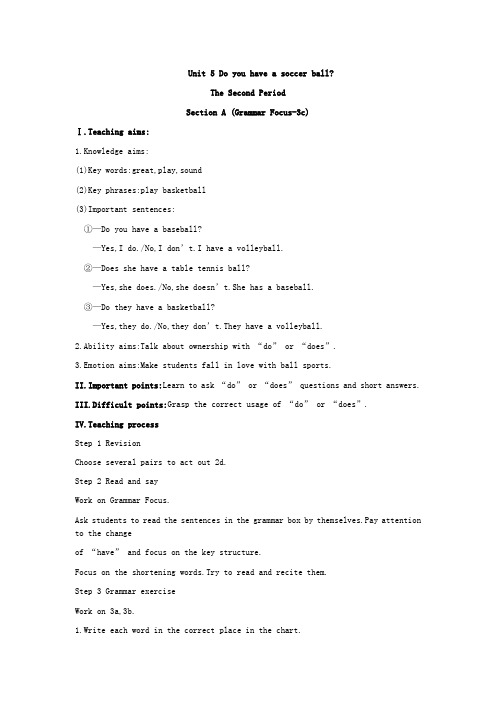人教新目标七年级英语上册Unit5 Do you have a soccer ball含有实义动词的句子的句型转换
英语:Unit 5 Do you have a soccer ball同步讲解(人教新目标七年级上)

Unit 5 Do you have a soccer ball知识扫描重点词汇: 运动物品的名称: ball, tennis, ping-pong, volleyball, basketball形容词: good, interesting, boring, fun, difficult, relaxing, great重点词组: soccer ball, tennis racket, watch TV, play sports, on TV, every day重点句型: 1. —Do you have a soccer ball?—Yes, I do. / No, I don’t.2. Let’s play soccer.3. I don’t have a soccer ball.4. That sounds good.重点话题: 谈论物品的所属关系及提建议。
写作训练: 用本单元所学知识,谈论你喜欢哪些活动,不喜欢哪些活动,并说明你对这些活动的看法。
课本讲解1. —Do you have a ping-pong ball? 你有乒乓球吗?—Yes, I do. 是的,我有。
(1) 这是一个含有实义动词的一般疑问句,其结构为“助动词Do (Does) + 主语+ 动词原形+ 其他?”。
其中have意为“有”,do为助动词,帮助实义动词构成一般疑问句和否定句,没有实际意义。
如:Do you have a pencil? 你有一枝铅笔吗?(2) Do you have ...? 的肯定回答用Yes, I do.,否定回答用No, I don’t.。
如:—Do you have a sister? 你有一个姐姐吗?—Yes, I do. 是的,我有。
/ No, I don’t. 不,我没有。
2. Let’s play tennis. 让我们打网球吧!Let’s ... 意为“让我们……吧!”,用来提出建议,后接动词原形,其中let’s是let us的缩写。
七年级英语上册Unit5Doyouhaveasoccerball教案新版人教新目标版

Unit 5 Do you have a soccer ball?The First PeriodSection A (1a-2d)Ⅰ.Teaching aims:1.Knowledge aims:(1)Keywords:do,have,tennis,ball,soccer,volleyball,basketball,let,us,go,we,late,has,ge t(2)Key phrases:soccer ball,let’s go,be late(3)Important sentences:A:Do you have a ping-pong bat?B:Yes,I do.A:Do you have a ping-pong ball?B:No,I don’t.2.Ability aims:Talk about different kinds of balls.3.Emotion aims:Make students fall in love with ball sports.II.Important points:Train students’ listening and speaking skills.III.Difficult points:Ask and answer questions using “do” or “does”.IV.Teaching processStep 1 Warming up1.Show a volleyball to the class.T:What’s this in English?Ss:It’s a volleyball.T:Yes,you are right.How do you spell it?Ss:V-O-L-L-E-Y-B-A-L-L,volleyball.Show students other objects,such as basketball,tennis ball,soccerball ,baseball,ping-pongbat...Teach students new words in the same way.2.Work on 1a.①Please look at the picture in 1a.There are some balls in it.Do you know what kindof balls theyare?Match the words with the things in the picture.②Teacher checks the answers.③Look at the key structure.—Do you have a ping-pong bat?—Yes,I do.—Do you have a ping-pong ball?—No,I don’t.Read the words and dialogue after the teacher and then read it together.Step 2 ListeningWork on 1b,2a,2b.1.Play the recording for the first time.Students only listen.2.Play the recording again and ask students to do 1b,2a,2b.3.Check the answers in 1b,2a,2b.Step 3 PairworkWork on 1c.Practice the conversation with your partner. Then ask and answer questions about the things in 1a.A: Do you have a ping-pong bat?B: Yes,I do.A: Do you have a ping-pong ball?B: No,I don’t.Work on 2c.Ask and answer questions about the people in 2a.A:Does Jane have a tennis ball?B:No,she doesn’t.Ask some pairs to act out their conversation.Step 4 Role-playWork on 2d.Let students read the conversation after the teacher,and then practice the conversation with theirpartners.Teacher asks some pairs to act out the conversation in front of the class.Language points1.have的用法(1)have为实义动词,意为“有”,常用句型为sb. have/has +sth.,表示“某人有某物”,当主语为第三人称单数时,have用其单三形式has。
七年级英语上册Unit5Doyouhaveasoccerball教案

Unit 5 Do you have a soccer ball?The Second PeriodSection A (Grammar Focus-3c)Ⅰ.Teaching aims:1.Knowledge aims:(1)Key words:great,play,sound(2)Key phrases:play basketball(3)Important sentences:①—Do you have a baseball?—Yes,I do./No,I don’t.I have a volleyball.②—Does she have a table tennis ball?—Yes,she does./No,she doesn’t.She has a baseball.③—Do they have a basketball?—Yes,they do./No,they don’t.They have a volleyball.2.Ability aims:Talk about ownership with “do” or “does”.3.Emotion aims:Make students fall in love with ball sports.II.Important points:Learn to ask “do” or “does” questions and short answers.III.Difficult points:Grasp the correct usage of “do” or “does”.IV.Teaching processStep 1 RevisionChoose several pairs to act out 2d.Step 2 Read and sayWork on Grammar Focus.Ask students to read the sentences in the grammar box by themselves.Pay attention to the changeof “have” and focus on the key structure.Focus on the shortening words.Try to read and recite them.Step 3 Grammar exerciseWork on 3a,3b.1.Write each word in the correct place in the chart.Check the answers with students.2.Fill in the blanks with do or does. Then practice the conversations with your partner.Teacher checks the answers with students,and then let students practice the conversations withtheir partner.Then teacher asks some pairs to act out their conversations.Step 4 Group work1.Remember the things in Bob’s room. Then close your books and ask and answer questions witha partner.A:Does Bob have a soccer ball?B:Yes,he does.语法拓展一、一般现在时中have的用法一般现在时的谓语动词可以由be动词(前面已学过)或实义动词来充当。
新目标英语七年级上册_unit_5_Do_you_have_a_soccer_ball B

let sb. do sth让某人做某事
Grammar Focus:
Do you have a baseball?
Yes, I do./ No, I don't. I have a volleyball.
Do you have a ping-pong bat?
where's=where is ,对地点提问,后接单数名词。
Let's 是 let us的缩写。 let’s包括说话人在内,let us不包括说话人在内。 本句是以let开头的祈使句,结构为“Let’s do sth.”, 意为“咱们……吧”,常用于提出建议。如: Let’s play basketball.
Yes, I do./ No, I don't. I have a ping-pong ball. Yes, they do./ No, they don't. They have a volleyball.
Do they have a basketball?
Does she have a tennis ball? Does he have a soccer ball?
× ×
×
1b Listen and circle the words you hear.
ping-pong bat
volleyball
soccer ball
ping-pong ball
Listening
A: Do you have a ping-pong bat?
B: Yes, I do.
A: Do you have a ping-pong ball?
七年级英语上册Unit5Doyouhaveasoccerball讲义(新版)人教新目标版

Unit 5 Do you have a soccer ball?Part 1 Words and Expressionsdo /du?/ (第三人称单数形式does /d?z/)aux v. 用于构成否定句和疑问句v. 做;干have /h?v/ v. 有tennis /'ten?s/ n. 网球ball /b??l/ n. 球ping-pong /'p??p??/ n. 乒乓球bat /b?t/ n. 球棒;球拍soccer /'s?k?(r)/ n. (英式)足球soccer ball (英式)足球volleyball /'v?lib??l/ n. 排球basketball /'bɑ?sk?tb??l/ n. 篮球hey /he?/ interj. 嘿;喂let /let/ v. 允许;让us /?s/ pron. (we 的宾格)我们let’s = let us 让我们(一起)go /g??/ v. 去;走we /wi?/ pron. 我们late /le?t/ adj. 迟到has /h?z/ v. (have 的第三人称单数形式) 有get /get/ v. 去取(或带来);得到great /gre?t/ adj. 美妙的;伟大的play /ple?/ v. 参加(比赛或运动);玩耍sound /sa?nd/ v. 听起来好像interesting /'?ntr?st??/ adj. 有趣的boring /'b??r??/ adj. 没趣的;令人厌倦的fun /f?n/ adj. 有趣的;使人快乐的n. 乐趣;快乐difficult /'d?f?k?lt/ adj. 困难的relaxing /r?'l?ks??/ adj. 轻松的;令人放松的watch /w?t?/ v. 注视;观看TV /,ti?'vi?/ n. (=television /'tel?v??n/)电视;电视机watch TV 看电视same /se?m/ adj. 相同的love /l?v/ v. & n. 爱;喜爱with /w?e/ prep. 和……在一起;带有;使用sport /sp??(r)t/ n. 体育运动them /e?m/ pron. (they 的宾格) 他(她、它)们only /'??nli/ adv. 只;仅like /la?k/ v. 喜欢;喜爱easy /'i?zi/ adj. 容易的;不费力的after /'ɑ?ft?(r)/ prep. & conj. 在……之后class /klɑ?s/ n. 班级;课classmate /'klɑ?sme?t/ n. 同班同学Bill /b?l/ 比尔(男名)Part 2:Texts课文(一)Cindy: Hey, Helen, let’s go! We’re late!Helen: OK.Cindy: Do you have the baseball?Helen: Yes, I do. It’s in my bag.Cindy: And where’s our baseballbat? Helen: Bill has it.Cindy: Oh, yeah. And do you have your jacket?Helen: Oh, no, I don’t. It’s on the chair. Letme get it. Cindy: And your hat, too!Helen: OK, I have my jacket and hat. Let’s go!Structure1. Do you have a baseball?Yes, I do./No, I don’t. I have a volleyball.2. Do you have a ping-pong bat?Yes, I do./No, I don’t. I have a ping-pong ball.3. Does she have a tennis ball?Yes, she does./No, she doesn’t. She has a baseball.4. Does he have a soccer ball?Yes, he does./No. he doesn’t. He has two ping-pong bats.5. Do they have a basketball?Yes, they do./No, they don’t. They have a volleyball.don’t = do not doesn’t = does not句型:—Do/Does sb. have…?—Yes, sb. do / does.—No, sb. don’t / doesn’t.Write each word in the correct place in the chart.将方框中的单词填入表格中正确的位置。
最新人教新目标版七年级英语上册Unit5DoyouhaveasoccerballSectionA课件 大赛获奖PPT课件

知识点 1.Do you have...? Section A 2.have/has 与 there be 3.let’s 祈使句 4.play 的用法 5.sound
考查星级 ★ ★★★ ★ ★★ ★★★
1.interesting 2.watch 的用法 3.代动词 does/do 4.介词 at 和 with 的用法 Section B & Self Check 5.love 的用法 6.them 的用法
That is a good idea. 那主意真不错。
1
2
3
4
[解读2] sound用作连系动词,意为“听上去;听起来”,后接形容 词作表语,说明主语的性质、状态等。口语中,当别人提出一些建 议后,你在表明个人观点时,可以用“That sounds...”表示“那听起 来……”。sound的单复数由主语的人称和数决定。 —Let’s play sports. 让我们做运动吧。 —That sounds great. 那听起来不错。
They play games in the classroom. 他们在教室里玩游戏。
1
2
3
4
拓展play的常见用法
1
2
3
4
4.That sounds good.(教材P27)那听起来不错。 [解读1] 该句是一个“主语+连系动词+表语”的简单句,that起承 上启下的作用,指上文中提出的建议,在句中作主语。
★★ ★★ ★ ★★ ★★★ ★ ★★ ★
7.It’s+形容词+for sb.to do sth. ★★ 8.after 的用法 9.class 的用法 语法聚焦
七年级英语上册 Unit 5 Do you have a soccer ball讲义 (新版)人教新
Unit 5 Do you have a soccer ball? Part 1 Words and Expressionsdo /duː/ (第三人称单数形式d oes /dʌz/)aux v. 用于构成否定句和疑问句v. 做;干have /hæv/ v. 有tennis /'tenɪs/ n. 网球ball /bɔːl/ n. 球ping-pong /'pɪŋpɔŋ/ n. 乒乓球bat /bæt/ n. 球棒;球拍soccer /'sɒkə(r)/ n. (英式)足球soccer ball (英式)足球volleyball /'vɒlibɔːl/ n. 排球basketball /'bɑːskɪtbɔːl/ n. 篮球hey /heɪ/ interj. 嘿;喂let /let/ v. 允许;让us /ʌs/ pron. (we 的宾格)我们let’s = let us 让我们(一起)go /gəʊ/ v. 去;走we /wiː/ pron. 我们late /leɪt/ adj. 迟到has /hæz/ v. (have 的第三人称单数形式) 有get /get/ v. 去取(或带来);得到great /greɪt/ adj. 美妙的;伟大的play /pleɪ/ v. 参加(比赛或运动);玩耍sound /saʊnd/ v. 听起来好像interesting /'ɪntrəstɪŋ/ adj. 有趣的boring /'bɔːrɪŋ/ adj. 没趣的;令人厌倦的fun /fʌn/ adj. 有趣的;使人快乐的n. 乐趣;快乐difficult /'dɪfɪkəlt/ adj. 困难的relaxing /rɪ'læksɪŋ/ adj. 轻松的;令人放松的watch /wɒtʃ/ v. 注视;观看TV /,tiː'viː/ n. (=television /'telɪvɪʒn/)电视;电视机watch TV 看电视same /seɪm/ adj. 相同的love /lʌv/ v. & n. 爱;喜爱with /wɪð/ prep. 和……在一起;带有;使用sport /spɔː(r)t/ n. 体育运动them /ðəm/ pron. (they 的宾格) 他(她、它)们only /'əʊnli/ adv. 只;仅like /laɪk/ v. 喜欢;喜爱easy /'iːzi/ adj. 容易的;不费力的after /'ɑːftə(r)/ prep. & conj. 在……之后class /klɑːs/ n. 班级;课classmate /'klɑːsmeɪt/ n. 同班同学Bill /bɪl/ 比尔(男名)Part 2:Texts课文(一)Cindy: Hey, Helen, let’s go! We’re late!Helen: OK.Cindy: Do you have the baseball? Helen: Y es,I do. It’s in my bag. Cindy: And where’sour baseball bat? Helen: Bill has it.Cindy: Oh, yeah. And do you have your jacket? Helen: Oh, no, I don’t. It’s on the chair. Let me get it. Cindy: And your hat, too!Helen: OK, I have my jacket and hat. Let’s go!Structure1. Do you have a baseball?Y es, I do./No, I don’t. I have a volleyball.2. Do you have a ping-pong bat?Y es, I do./No, I don’t. I have a ping-pong ball.3. Does she have a tennis ball?Y es, she does./No, she doesn’t. She has a baseball.4. Does he have a soccer ball?Y es, he does./No. he doesn’t. He has two ping-pong bats.5. Do they have a basketball?Y es, they do./No, they don’t. They have a volleyball.don’t = do not doesn’t = does not句型:—Do/Does sb. have…?—Y es, sb. do / does.—No, sb. don’t / doesn’t.Write each word in the correct place in the chart.将方框中的单词填入表格中正确的位置。
七年级英语上册 Unit 5 Do you have a soccer ball Section A
2. —Does Cindy have a soccer ball?
—No, she doesn't. But she has a volleyball.
3. —Do Gina and Jane have a soccer ball?
—No, they don't. But they have a tennis ball.
4. —Do you have a soccer ball?
—No, I don't. But I have a basketball.
5. —Well, let's play basketball.
—That sounds great. Let's go!
当主语是第三人称单数时,谓语动词用has;当主语是
其它人称时,谓语动词用have。如:
He has a baseball. 他有一个棒球。
I have a new schoolbag. 我有一个新书包。
第2页
2. 否定句 否定句式:主语+don't/doesn't have … 当主语为第三人称时,要借助doesn't组成否定句;当主 语为其它人称时,借助don't组成否定句。如: I don't have a soccer ball. 我没有足球。 She doesn't have a ruler. 她没有尺子。 3. 普通疑问句 普通疑问句句式:Do/Does+主语+have …? 必定回答:Yes, 主语+do/does. 否定回答:No, 主语+don't/doesn't.
七年级英语上册 Unit 5 Do youhave a soccer ball(第4课时)Section B阅读课教案 (新版)人教新目标版
Unit 5 Do you have a soccer ball?Period Four (Section B)—阅读课Teaching and learning Goals:1. Review the Plural form of Nouns2.The Present Simple Tense of verbs。
Pay attention to the rules do→ does3.To write something by using the drills they have learnt.4.Reading and writing practice.Teaching and learning steps :Step I ReviewShow some pictures of ball games or feelings ,ask Ss to say “What do you think of basketball....?”to review the words they have learnt in last lesson.设计意图:复习前面学过的内容,温故而知新,通过表述的形式,使老师了解学生运用的情况。
StepII Warming up and leading in1.(Show the pictures of balls to students.)tennis racket s basketball sping-pong ball s and bat sT: I have two tennis rackets, three basketballs and four ping-pong balls and bats.This is my sports collection.(Repeat the collection several times and teach the new word.)T: What about you?(Ask some students to say something about their own collections.)S: I have three…2. T: I don’t have a soccer ball . Do you have a soccer ball ?Ss: Yes, I do./ No, I don’t.T: Let’s look at the three students. Frank Brown, Gina Smith, Wang Wei.Do they have a soccer ball?设计意图:利用学生的切身体会和实际情况引入新课,容易引起学生的关注,同时在复习过程中对名词的复数进行了复习。
Unit 5 Do you have a soccer ball_教案
41’09’’---
41’22’’
Help the Ss set a correct attitude.
Sports make us healthy! Playing sports with friends make us happy!
Ss conclude and try to feel and getthecorrect moral attitude.
利用电子白板清晰标注标题问句及每段第一句话中的关键词,帮助学生迅速得出答案。用图片表达猜测与事实不符合的惊讶,引起学生好奇。利用电子白板圈出三个孩子不只是回答了标题的问句,还各自有阐述。为后文做铺垫
2b
While-reading (Scanning)
12’04’’--
19’19’’
Guide the Ss to understand the reading passage well.
A: Do you have a …?
B: Yes, I do. I have a…/No, I don’t . I don’t have a…
Ask and answer.
利用电子白板展示很多学生学习过的球类名词图片,激发学生的学习兴趣,使教学环境更加真实生动。
Free talk
2’56’’---
利用电子白板对比标注指令中的中英文,学生能很快理解老师的指令,帮助其消除学习新课的紧张。
Situation Presentation
6’18’’---
6’34’’
To set a big situation for the whole lessonand lead in 2b, the reading material naturally.
